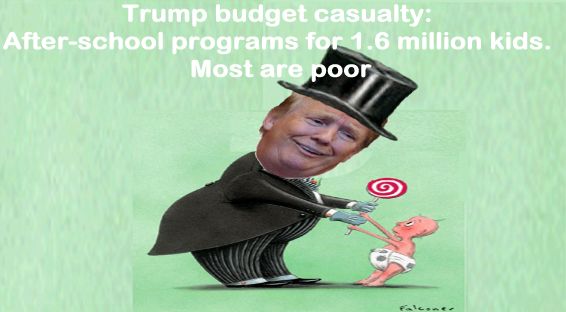Trump budget casualty: After-school programs for 1.6 million kids. Most are poor.
Every weekday, 700 children from some of the poorest parts of the Atlanta area stay after school for three hours with Wings for Kids, a program that aims to bolster not only academic performance but also social skills, relationships with caring adults and a sense of belonging at school.
The kids get a safe and enriching place to spend the afternoon and early evening, and their working parents get child-care. But now Wings for Kids and thousands of programs like it are on the chopping block, threatened by President Trump’s proposal to eliminate $1.2 billion in grants for after-school and summer programs.
“It’s heart-wrenching,” said Bridget Laird, chief executive of Wings for Kids, which serves 1,600 children in Atlanta; Charlotte; Charleston, S.C.; and rural Lake City, S.C. She said Thursday that without federal aid, those programs would be eliminated or gutted. “I can’t imagine if that were turned off — all of those kids running around the streets.”
The program Trump is seeking to ax — known as the 21st Century Community Learning Centers — helps school districts, churches and nonprofits serve more than 1.6 million children nationwide. The administration argues that there’s no evidence the program has been effective. But Heather Weiss — who has studied after-school programs for nearly 20 years — said that’s not true.
“There is a lot of evidence,” she said. “Engaging kids in high-quality after-school and programs, many of which are supported by 21st Century Community Learning Centers grants, results in kids doing better in school. They’re more likely to graduate and to excel in the labor market.”
The proposal is one cut among many in a budget that would slash federal education spending by $9 billion in 2018, or 13.5 percent. Trump aims to eliminate billions for teacher training and scale back or end several programs that help low-income students prepare and pay for college.
At the same time, Trump is seeking to shift a historic amount of money — $1.4 billion — into charter schools, private-school vouchers and Title I “portability,” a controversial form of choice that would allow $1 billion in federal funds to follow poor children to the public school of their choice. Advocates hope it would give poor children access to better schools; critics fear it would dilute funds available to the nation’s neediest schools.
“The budget places power in the hands of parents and families to choose schools that are best for their children,” Education Secretary Betsy DeVos said in a statement. It is “the first step in investing in education programs that work.”
Some conservatives hailed the budget as a sign that Trump intends to make good on his Trump budget casualty: After-school programs for 1.6 million kids. Most are poor. - The Washington Post:


